Management Assessment 1: The Impact of Airbnb on Global Tourism
VerifiedAdded on 2023/04/08
|7
|1498
|434
Report
AI Summary
This report provides an introduction to Airbnb, a global company revolutionizing the travel accommodations market. It explores Airbnb's business model, which connects travelers with diverse experiences worldwide, emphasizing the sharing economy and local engagement. The report delves into the concept of authenticity in tourism, distinguishing between objective, existential, and constructive authenticity, and how Airbnb leverages this concept in its marketing strategy. It examines the positive impacts of Airbnb, such as encouraging exploration beyond traditional tourist spots and supporting local businesses. The report also discusses how Airbnb has successfully embraced the concept of authenticity to provide distinguished tourism experiences, driven by the effective use of technology and a shift in consumer behavior, with references to the motivations of travelers choosing Airbnb over traditional hotels.
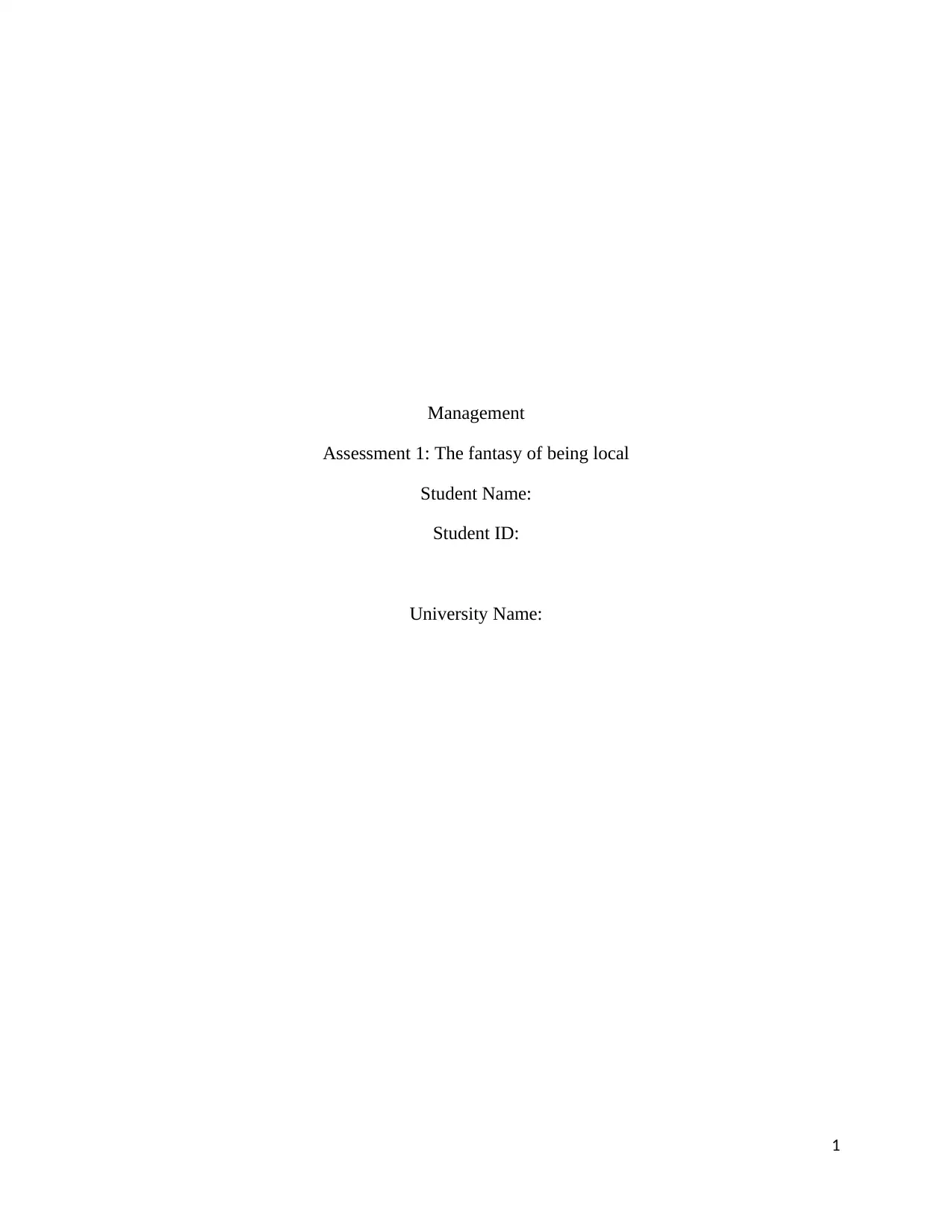
Management
Assessment 1: The fantasy of being local
Student Name:
Student ID:
University Name:
1
Assessment 1: The fantasy of being local
Student Name:
Student ID:
University Name:
1
Paraphrase This Document
Need a fresh take? Get an instant paraphrase of this document with our AI Paraphraser
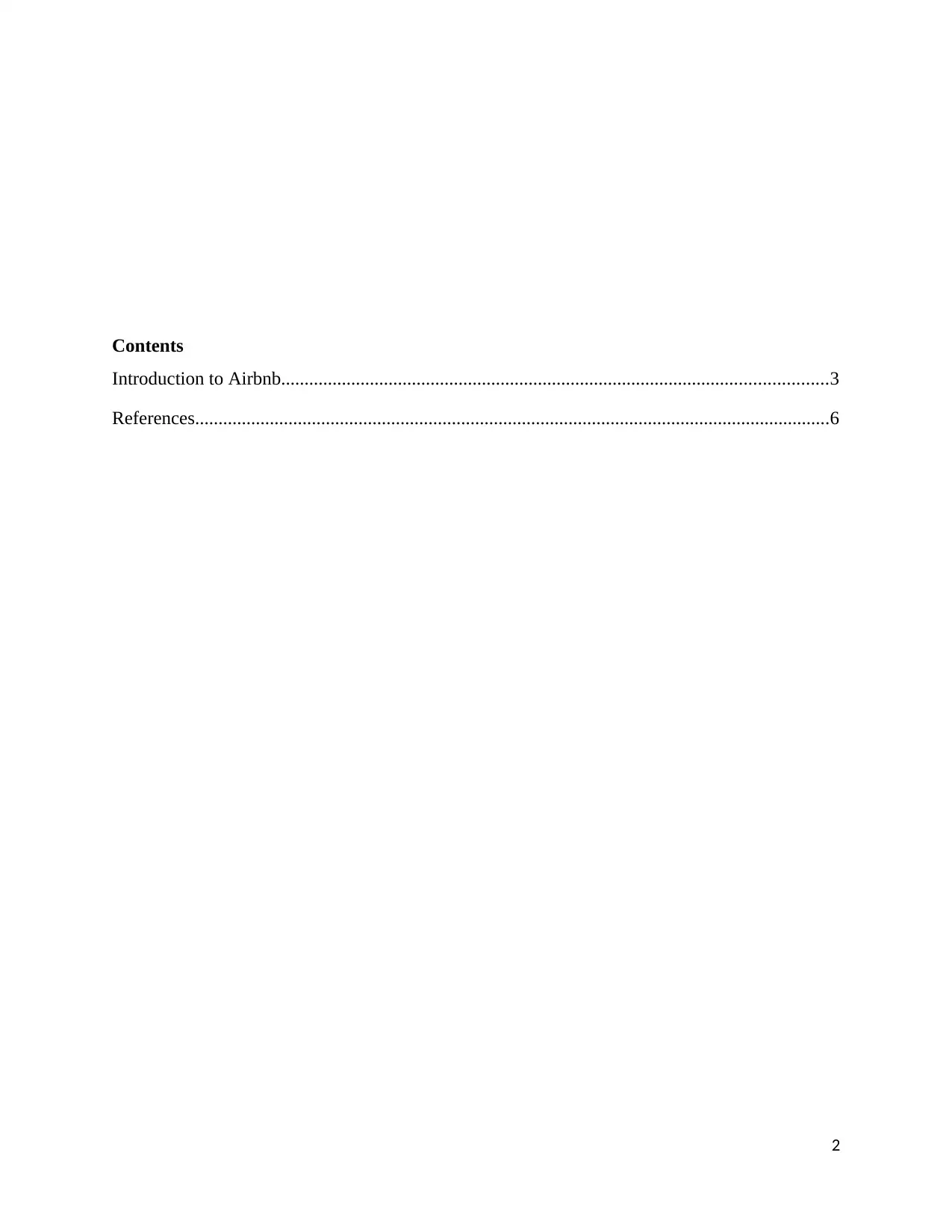
Contents
Introduction to Airbnb.....................................................................................................................3
References........................................................................................................................................6
2
Introduction to Airbnb.....................................................................................................................3
References........................................................................................................................................6
2
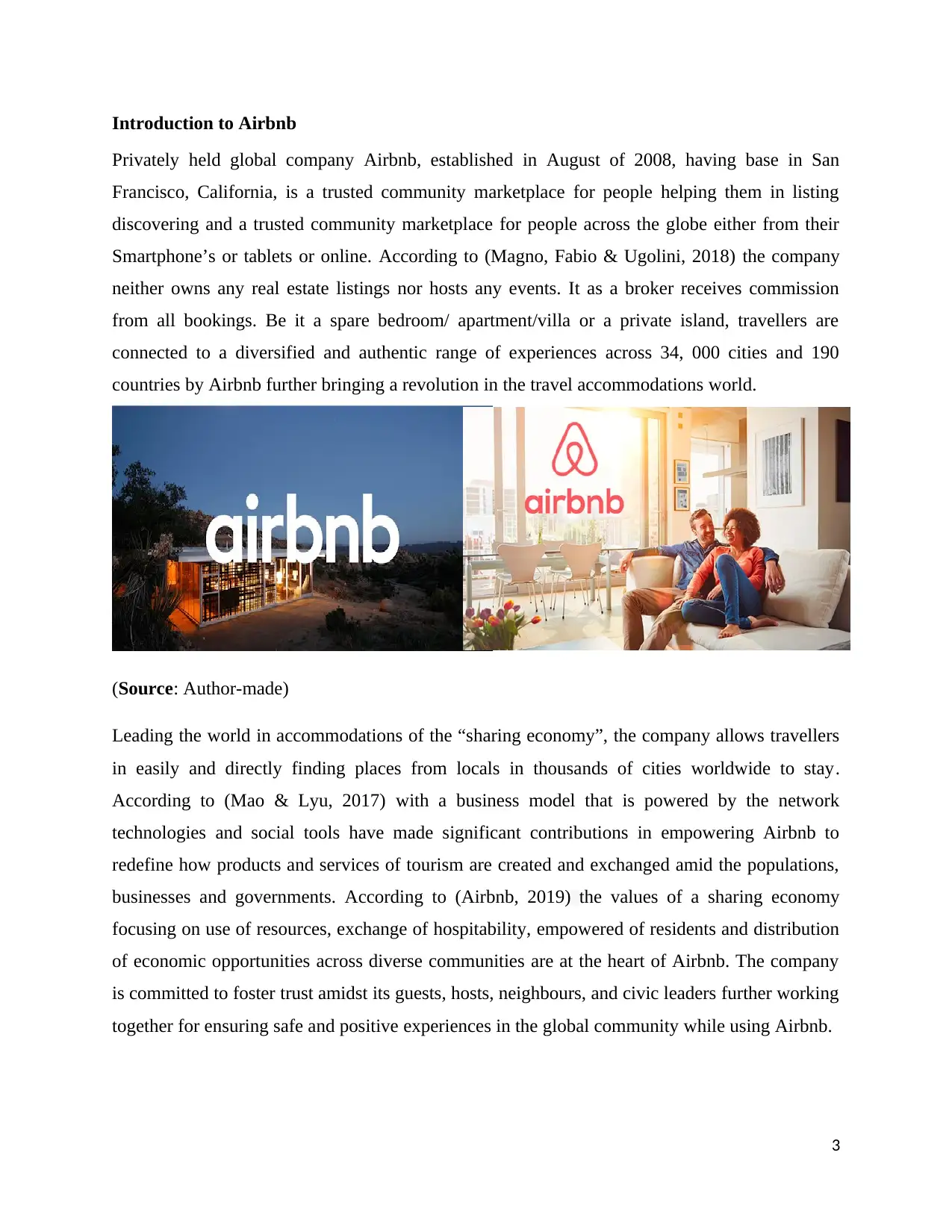
Introduction to Airbnb
Privately held global company Airbnb, established in August of 2008, having base in San
Francisco, California, is a trusted community marketplace for people helping them in listing
discovering and a trusted community marketplace for people across the globe either from their
Smartphone’s or tablets or online. According to (Magno, Fabio & Ugolini, 2018) the company
neither owns any real estate listings nor hosts any events. It as a broker receives commission
from all bookings. Be it a spare bedroom/ apartment/villa or a private island, travellers are
connected to a diversified and authentic range of experiences across 34, 000 cities and 190
countries by Airbnb further bringing a revolution in the travel accommodations world.
(Source: Author-made)
Leading the world in accommodations of the “sharing economy”, the company allows travellers
in easily and directly finding places from locals in thousands of cities worldwide to stay.
According to (Mao & Lyu, 2017) with a business model that is powered by the network
technologies and social tools have made significant contributions in empowering Airbnb to
redefine how products and services of tourism are created and exchanged amid the populations,
businesses and governments. According to (Airbnb, 2019) the values of a sharing economy
focusing on use of resources, exchange of hospitability, empowered of residents and distribution
of economic opportunities across diverse communities are at the heart of Airbnb. The company
is committed to foster trust amidst its guests, hosts, neighbours, and civic leaders further working
together for ensuring safe and positive experiences in the global community while using Airbnb.
3
Privately held global company Airbnb, established in August of 2008, having base in San
Francisco, California, is a trusted community marketplace for people helping them in listing
discovering and a trusted community marketplace for people across the globe either from their
Smartphone’s or tablets or online. According to (Magno, Fabio & Ugolini, 2018) the company
neither owns any real estate listings nor hosts any events. It as a broker receives commission
from all bookings. Be it a spare bedroom/ apartment/villa or a private island, travellers are
connected to a diversified and authentic range of experiences across 34, 000 cities and 190
countries by Airbnb further bringing a revolution in the travel accommodations world.
(Source: Author-made)
Leading the world in accommodations of the “sharing economy”, the company allows travellers
in easily and directly finding places from locals in thousands of cities worldwide to stay.
According to (Mao & Lyu, 2017) with a business model that is powered by the network
technologies and social tools have made significant contributions in empowering Airbnb to
redefine how products and services of tourism are created and exchanged amid the populations,
businesses and governments. According to (Airbnb, 2019) the values of a sharing economy
focusing on use of resources, exchange of hospitability, empowered of residents and distribution
of economic opportunities across diverse communities are at the heart of Airbnb. The company
is committed to foster trust amidst its guests, hosts, neighbours, and civic leaders further working
together for ensuring safe and positive experiences in the global community while using Airbnb.
3
⊘ This is a preview!⊘
Do you want full access?
Subscribe today to unlock all pages.

Trusted by 1+ million students worldwide
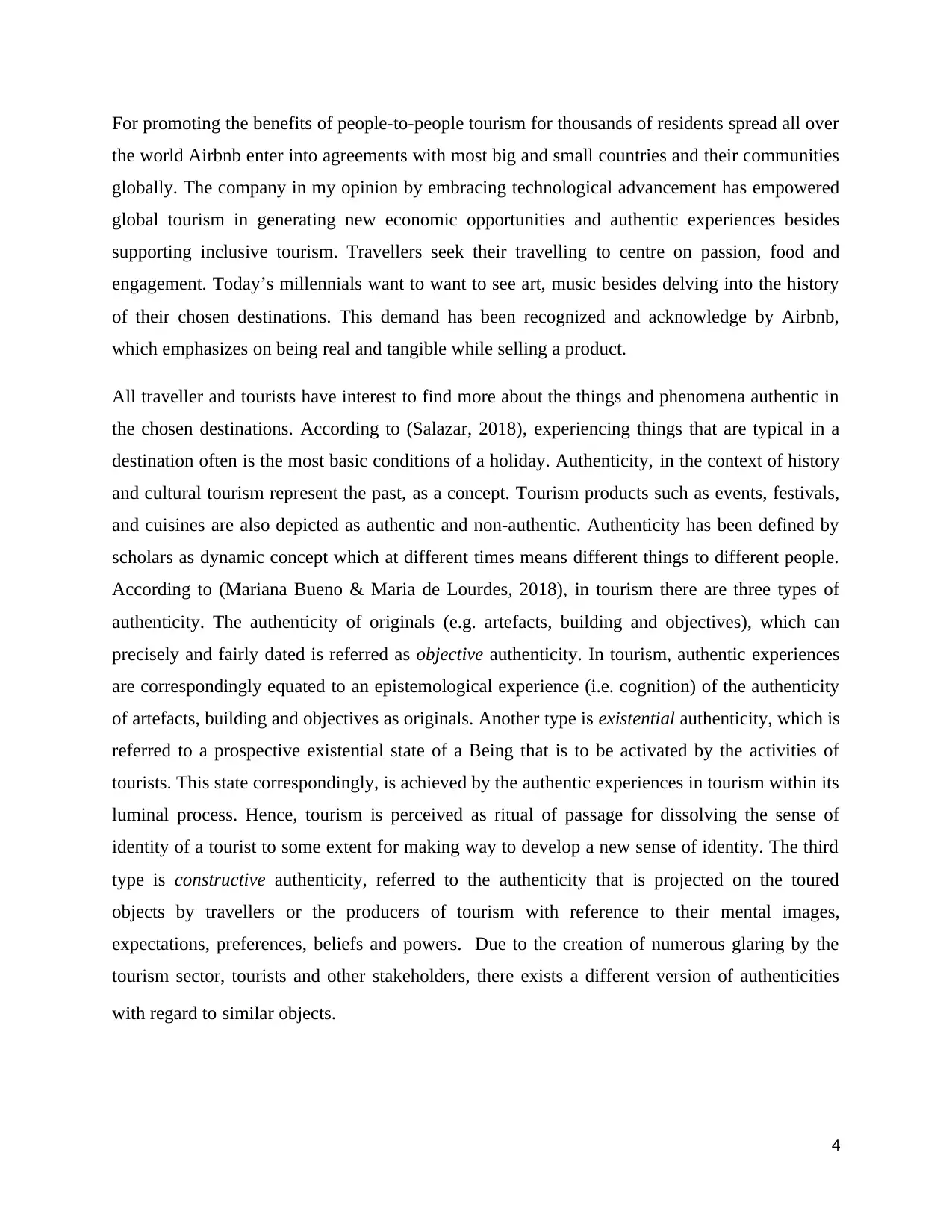
For promoting the benefits of people-to-people tourism for thousands of residents spread all over
the world Airbnb enter into agreements with most big and small countries and their communities
globally. The company in my opinion by embracing technological advancement has empowered
global tourism in generating new economic opportunities and authentic experiences besides
supporting inclusive tourism. Travellers seek their travelling to centre on passion, food and
engagement. Today’s millennials want to want to see art, music besides delving into the history
of their chosen destinations. This demand has been recognized and acknowledge by Airbnb,
which emphasizes on being real and tangible while selling a product.
All traveller and tourists have interest to find more about the things and phenomena authentic in
the chosen destinations. According to (Salazar, 2018), experiencing things that are typical in a
destination often is the most basic conditions of a holiday. Authenticity, in the context of history
and cultural tourism represent the past, as a concept. Tourism products such as events, festivals,
and cuisines are also depicted as authentic and non-authentic. Authenticity has been defined by
scholars as dynamic concept which at different times means different things to different people.
According to (Mariana Bueno & Maria de Lourdes, 2018), in tourism there are three types of
authenticity. The authenticity of originals (e.g. artefacts, building and objectives), which can
precisely and fairly dated is referred as objective authenticity. In tourism, authentic experiences
are correspondingly equated to an epistemological experience (i.e. cognition) of the authenticity
of artefacts, building and objectives as originals. Another type is existential authenticity, which is
referred to a prospective existential state of a Being that is to be activated by the activities of
tourists. This state correspondingly, is achieved by the authentic experiences in tourism within its
luminal process. Hence, tourism is perceived as ritual of passage for dissolving the sense of
identity of a tourist to some extent for making way to develop a new sense of identity. The third
type is constructive authenticity, referred to the authenticity that is projected on the toured
objects by travellers or the producers of tourism with reference to their mental images,
expectations, preferences, beliefs and powers. Due to the creation of numerous glaring by the
tourism sector, tourists and other stakeholders, there exists a different version of authenticities
with regard to similar objects.
4
the world Airbnb enter into agreements with most big and small countries and their communities
globally. The company in my opinion by embracing technological advancement has empowered
global tourism in generating new economic opportunities and authentic experiences besides
supporting inclusive tourism. Travellers seek their travelling to centre on passion, food and
engagement. Today’s millennials want to want to see art, music besides delving into the history
of their chosen destinations. This demand has been recognized and acknowledge by Airbnb,
which emphasizes on being real and tangible while selling a product.
All traveller and tourists have interest to find more about the things and phenomena authentic in
the chosen destinations. According to (Salazar, 2018), experiencing things that are typical in a
destination often is the most basic conditions of a holiday. Authenticity, in the context of history
and cultural tourism represent the past, as a concept. Tourism products such as events, festivals,
and cuisines are also depicted as authentic and non-authentic. Authenticity has been defined by
scholars as dynamic concept which at different times means different things to different people.
According to (Mariana Bueno & Maria de Lourdes, 2018), in tourism there are three types of
authenticity. The authenticity of originals (e.g. artefacts, building and objectives), which can
precisely and fairly dated is referred as objective authenticity. In tourism, authentic experiences
are correspondingly equated to an epistemological experience (i.e. cognition) of the authenticity
of artefacts, building and objectives as originals. Another type is existential authenticity, which is
referred to a prospective existential state of a Being that is to be activated by the activities of
tourists. This state correspondingly, is achieved by the authentic experiences in tourism within its
luminal process. Hence, tourism is perceived as ritual of passage for dissolving the sense of
identity of a tourist to some extent for making way to develop a new sense of identity. The third
type is constructive authenticity, referred to the authenticity that is projected on the toured
objects by travellers or the producers of tourism with reference to their mental images,
expectations, preferences, beliefs and powers. Due to the creation of numerous glaring by the
tourism sector, tourists and other stakeholders, there exists a different version of authenticities
with regard to similar objects.
4
Paraphrase This Document
Need a fresh take? Get an instant paraphrase of this document with our AI Paraphraser
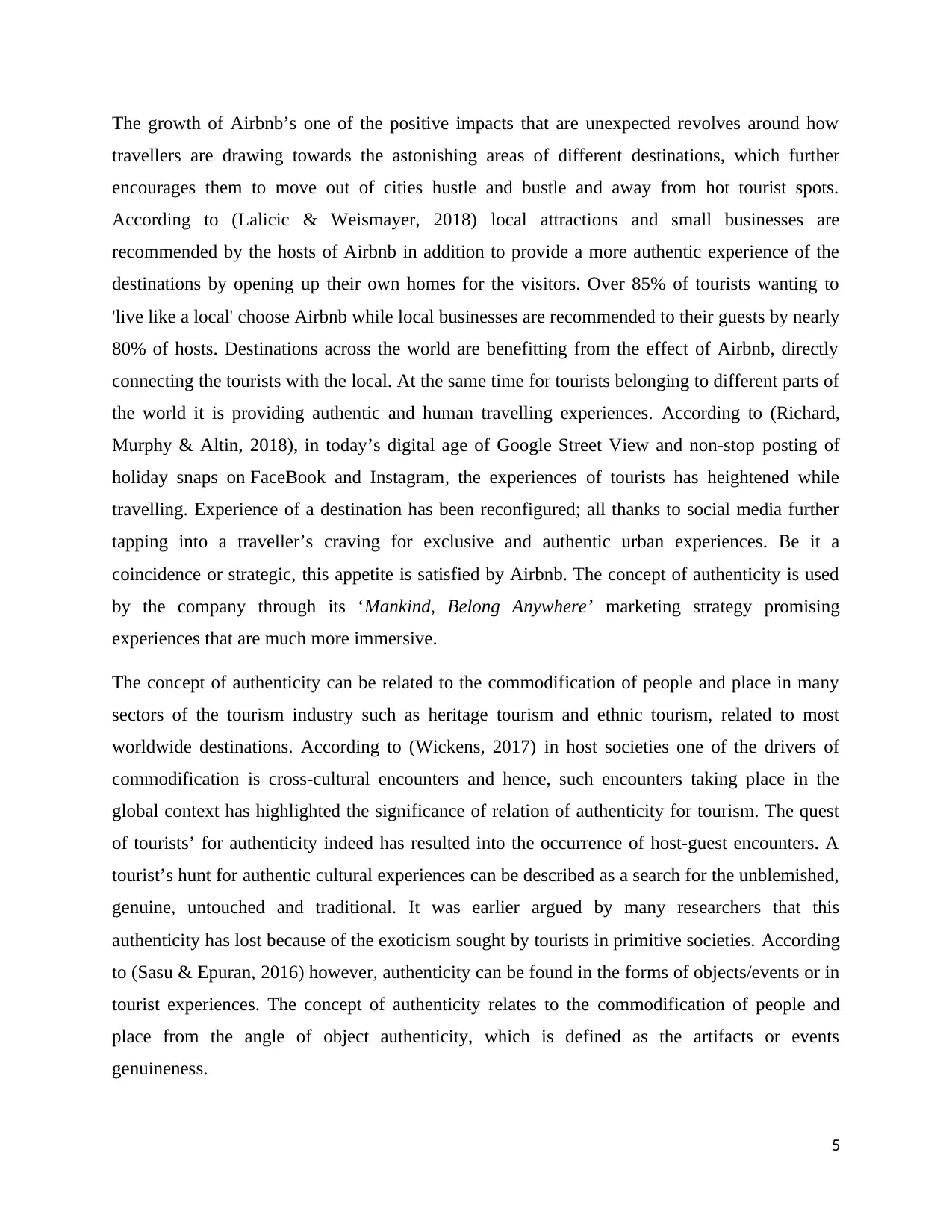
The growth of Airbnb’s one of the positive impacts that are unexpected revolves around how
travellers are drawing towards the astonishing areas of different destinations, which further
encourages them to move out of cities hustle and bustle and away from hot tourist spots.
According to (Lalicic & Weismayer, 2018) local attractions and small businesses are
recommended by the hosts of Airbnb in addition to provide a more authentic experience of the
destinations by opening up their own homes for the visitors. Over 85% of tourists wanting to
'live like a local' choose Airbnb while local businesses are recommended to their guests by nearly
80% of hosts. Destinations across the world are benefitting from the effect of Airbnb, directly
connecting the tourists with the local. At the same time for tourists belonging to different parts of
the world it is providing authentic and human travelling experiences. According to (Richard,
Murphy & Altin, 2018), in today’s digital age of Google Street View and non-stop posting of
holiday snaps on FaceBook and Instagram, the experiences of tourists has heightened while
travelling. Experience of a destination has been reconfigured; all thanks to social media further
tapping into a traveller’s craving for exclusive and authentic urban experiences. Be it a
coincidence or strategic, this appetite is satisfied by Airbnb. The concept of authenticity is used
by the company through its ‘Mankind, Belong Anywhere’ marketing strategy promising
experiences that are much more immersive.
The concept of authenticity can be related to the commodification of people and place in many
sectors of the tourism industry such as heritage tourism and ethnic tourism, related to most
worldwide destinations. According to (Wickens, 2017) in host societies one of the drivers of
commodification is cross-cultural encounters and hence, such encounters taking place in the
global context has highlighted the significance of relation of authenticity for tourism. The quest
of tourists’ for authenticity indeed has resulted into the occurrence of host-guest encounters. A
tourist’s hunt for authentic cultural experiences can be described as a search for the unblemished,
genuine, untouched and traditional. It was earlier argued by many researchers that this
authenticity has lost because of the exoticism sought by tourists in primitive societies. According
to (Sasu & Epuran, 2016) however, authenticity can be found in the forms of objects/events or in
tourist experiences. The concept of authenticity relates to the commodification of people and
place from the angle of object authenticity, which is defined as the artifacts or events
genuineness.
5
travellers are drawing towards the astonishing areas of different destinations, which further
encourages them to move out of cities hustle and bustle and away from hot tourist spots.
According to (Lalicic & Weismayer, 2018) local attractions and small businesses are
recommended by the hosts of Airbnb in addition to provide a more authentic experience of the
destinations by opening up their own homes for the visitors. Over 85% of tourists wanting to
'live like a local' choose Airbnb while local businesses are recommended to their guests by nearly
80% of hosts. Destinations across the world are benefitting from the effect of Airbnb, directly
connecting the tourists with the local. At the same time for tourists belonging to different parts of
the world it is providing authentic and human travelling experiences. According to (Richard,
Murphy & Altin, 2018), in today’s digital age of Google Street View and non-stop posting of
holiday snaps on FaceBook and Instagram, the experiences of tourists has heightened while
travelling. Experience of a destination has been reconfigured; all thanks to social media further
tapping into a traveller’s craving for exclusive and authentic urban experiences. Be it a
coincidence or strategic, this appetite is satisfied by Airbnb. The concept of authenticity is used
by the company through its ‘Mankind, Belong Anywhere’ marketing strategy promising
experiences that are much more immersive.
The concept of authenticity can be related to the commodification of people and place in many
sectors of the tourism industry such as heritage tourism and ethnic tourism, related to most
worldwide destinations. According to (Wickens, 2017) in host societies one of the drivers of
commodification is cross-cultural encounters and hence, such encounters taking place in the
global context has highlighted the significance of relation of authenticity for tourism. The quest
of tourists’ for authenticity indeed has resulted into the occurrence of host-guest encounters. A
tourist’s hunt for authentic cultural experiences can be described as a search for the unblemished,
genuine, untouched and traditional. It was earlier argued by many researchers that this
authenticity has lost because of the exoticism sought by tourists in primitive societies. According
to (Sasu & Epuran, 2016) however, authenticity can be found in the forms of objects/events or in
tourist experiences. The concept of authenticity relates to the commodification of people and
place from the angle of object authenticity, which is defined as the artifacts or events
genuineness.
5
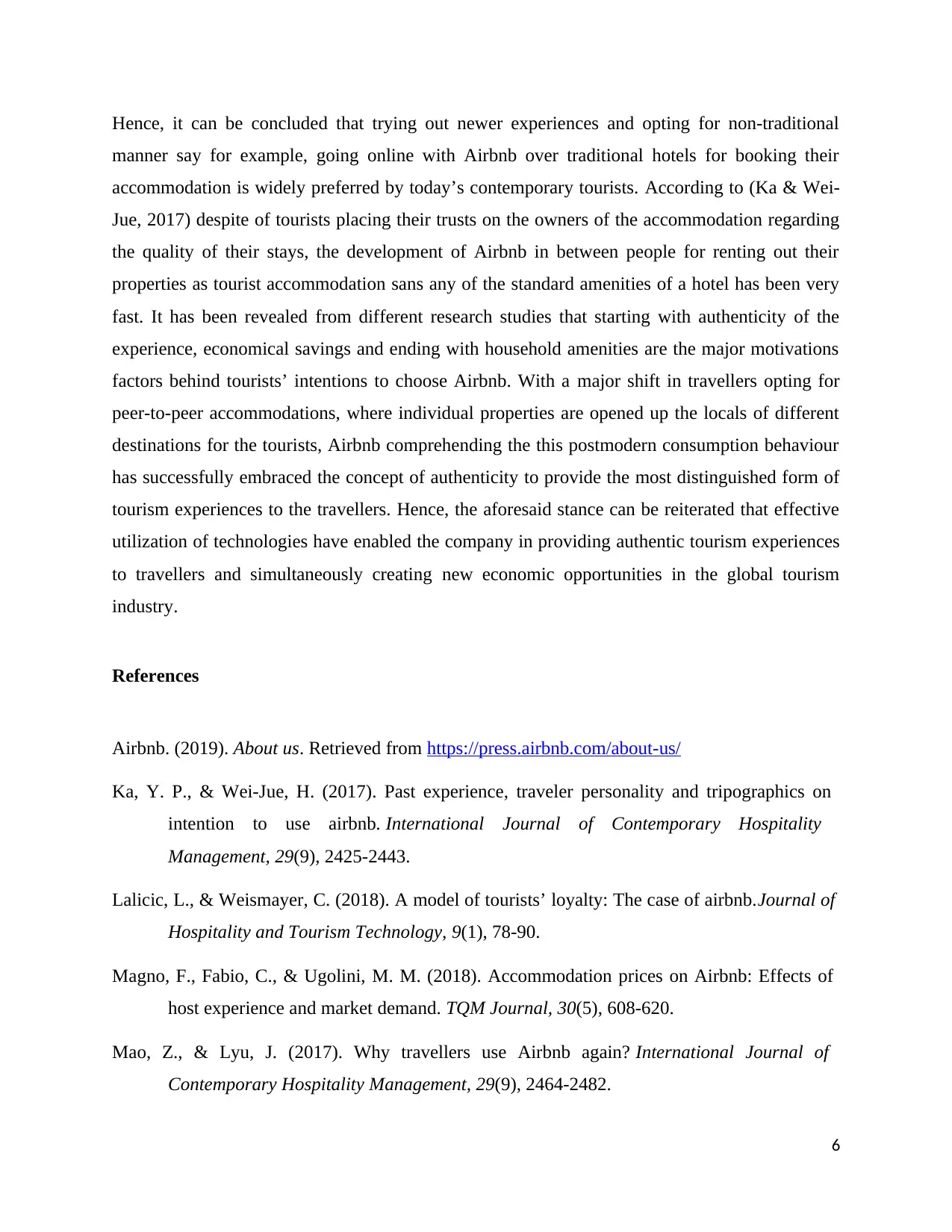
Hence, it can be concluded that trying out newer experiences and opting for non-traditional
manner say for example, going online with Airbnb over traditional hotels for booking their
accommodation is widely preferred by today’s contemporary tourists. According to (Ka & Wei-
Jue, 2017) despite of tourists placing their trusts on the owners of the accommodation regarding
the quality of their stays, the development of Airbnb in between people for renting out their
properties as tourist accommodation sans any of the standard amenities of a hotel has been very
fast. It has been revealed from different research studies that starting with authenticity of the
experience, economical savings and ending with household amenities are the major motivations
factors behind tourists’ intentions to choose Airbnb. With a major shift in travellers opting for
peer-to-peer accommodations, where individual properties are opened up the locals of different
destinations for the tourists, Airbnb comprehending the this postmodern consumption behaviour
has successfully embraced the concept of authenticity to provide the most distinguished form of
tourism experiences to the travellers. Hence, the aforesaid stance can be reiterated that effective
utilization of technologies have enabled the company in providing authentic tourism experiences
to travellers and simultaneously creating new economic opportunities in the global tourism
industry.
References
Airbnb. (2019). About us. Retrieved from https://press.airbnb.com/about-us/
Ka, Y. P., & Wei-Jue, H. (2017). Past experience, traveler personality and tripographics on
intention to use airbnb. International Journal of Contemporary Hospitality
Management, 29(9), 2425-2443.
Lalicic, L., & Weismayer, C. (2018). A model of tourists’ loyalty: The case of airbnb.Journal of
Hospitality and Tourism Technology, 9(1), 78-90.
Magno, F., Fabio, C., & Ugolini, M. M. (2018). Accommodation prices on Airbnb: Effects of
host experience and market demand. TQM Journal, 30(5), 608-620.
Mao, Z., & Lyu, J. (2017). Why travellers use Airbnb again? International Journal of
Contemporary Hospitality Management, 29(9), 2464-2482.
6
manner say for example, going online with Airbnb over traditional hotels for booking their
accommodation is widely preferred by today’s contemporary tourists. According to (Ka & Wei-
Jue, 2017) despite of tourists placing their trusts on the owners of the accommodation regarding
the quality of their stays, the development of Airbnb in between people for renting out their
properties as tourist accommodation sans any of the standard amenities of a hotel has been very
fast. It has been revealed from different research studies that starting with authenticity of the
experience, economical savings and ending with household amenities are the major motivations
factors behind tourists’ intentions to choose Airbnb. With a major shift in travellers opting for
peer-to-peer accommodations, where individual properties are opened up the locals of different
destinations for the tourists, Airbnb comprehending the this postmodern consumption behaviour
has successfully embraced the concept of authenticity to provide the most distinguished form of
tourism experiences to the travellers. Hence, the aforesaid stance can be reiterated that effective
utilization of technologies have enabled the company in providing authentic tourism experiences
to travellers and simultaneously creating new economic opportunities in the global tourism
industry.
References
Airbnb. (2019). About us. Retrieved from https://press.airbnb.com/about-us/
Ka, Y. P., & Wei-Jue, H. (2017). Past experience, traveler personality and tripographics on
intention to use airbnb. International Journal of Contemporary Hospitality
Management, 29(9), 2425-2443.
Lalicic, L., & Weismayer, C. (2018). A model of tourists’ loyalty: The case of airbnb.Journal of
Hospitality and Tourism Technology, 9(1), 78-90.
Magno, F., Fabio, C., & Ugolini, M. M. (2018). Accommodation prices on Airbnb: Effects of
host experience and market demand. TQM Journal, 30(5), 608-620.
Mao, Z., & Lyu, J. (2017). Why travellers use Airbnb again? International Journal of
Contemporary Hospitality Management, 29(9), 2464-2482.
6
⊘ This is a preview!⊘
Do you want full access?
Subscribe today to unlock all pages.

Trusted by 1+ million students worldwide
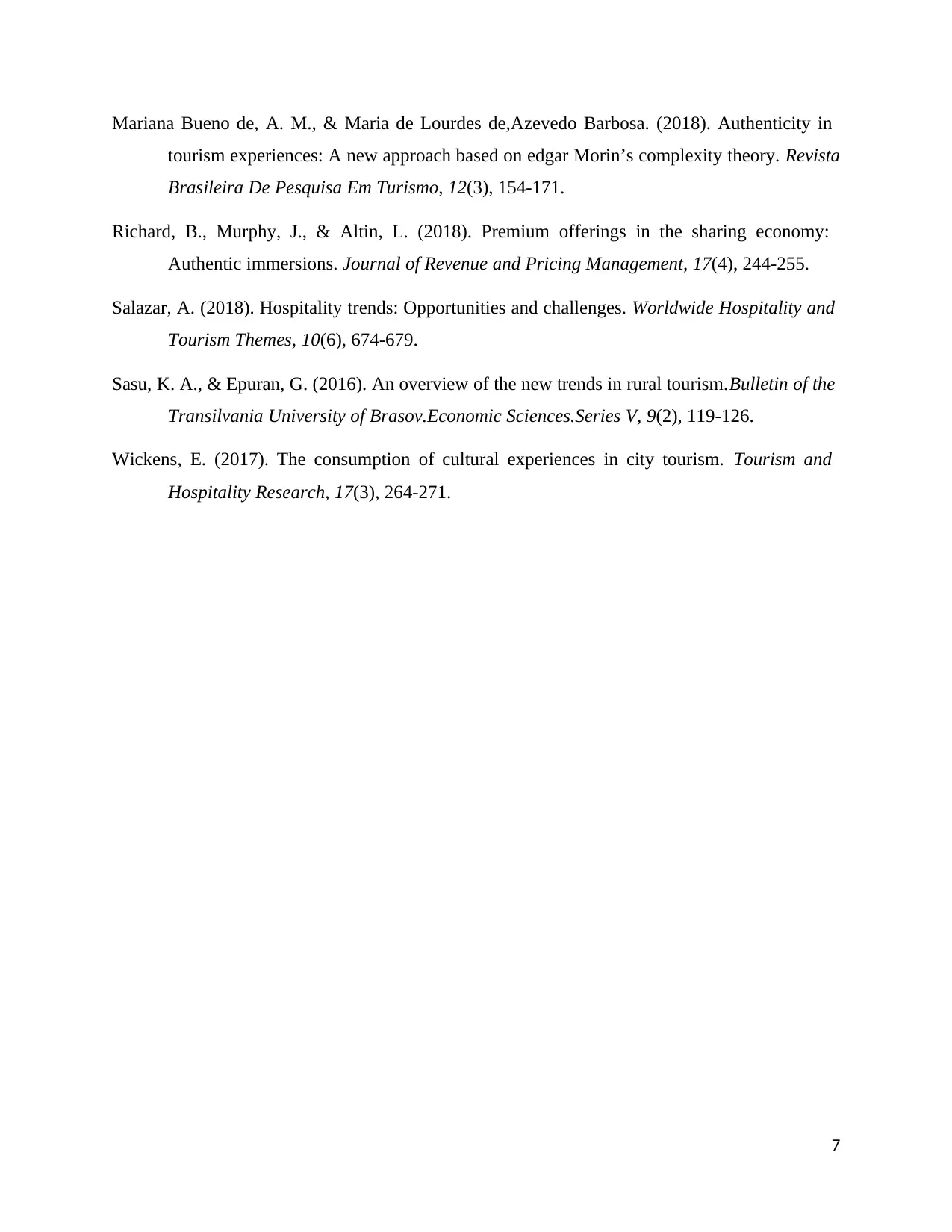
Mariana Bueno de, A. M., & Maria de Lourdes de,Azevedo Barbosa. (2018). Authenticity in
tourism experiences: A new approach based on edgar Morin’s complexity theory. Revista
Brasileira De Pesquisa Em Turismo, 12(3), 154-171.
Richard, B., Murphy, J., & Altin, L. (2018). Premium offerings in the sharing economy:
Authentic immersions. Journal of Revenue and Pricing Management, 17(4), 244-255.
Salazar, A. (2018). Hospitality trends: Opportunities and challenges. Worldwide Hospitality and
Tourism Themes, 10(6), 674-679.
Sasu, K. A., & Epuran, G. (2016). An overview of the new trends in rural tourism.Bulletin of the
Transilvania University of Brasov.Economic Sciences.Series V, 9(2), 119-126.
Wickens, E. (2017). The consumption of cultural experiences in city tourism. Tourism and
Hospitality Research, 17(3), 264-271.
7
tourism experiences: A new approach based on edgar Morin’s complexity theory. Revista
Brasileira De Pesquisa Em Turismo, 12(3), 154-171.
Richard, B., Murphy, J., & Altin, L. (2018). Premium offerings in the sharing economy:
Authentic immersions. Journal of Revenue and Pricing Management, 17(4), 244-255.
Salazar, A. (2018). Hospitality trends: Opportunities and challenges. Worldwide Hospitality and
Tourism Themes, 10(6), 674-679.
Sasu, K. A., & Epuran, G. (2016). An overview of the new trends in rural tourism.Bulletin of the
Transilvania University of Brasov.Economic Sciences.Series V, 9(2), 119-126.
Wickens, E. (2017). The consumption of cultural experiences in city tourism. Tourism and
Hospitality Research, 17(3), 264-271.
7
1 out of 7
Related Documents
Your All-in-One AI-Powered Toolkit for Academic Success.
+13062052269
info@desklib.com
Available 24*7 on WhatsApp / Email
![[object Object]](/_next/static/media/star-bottom.7253800d.svg)
Unlock your academic potential
Copyright © 2020–2026 A2Z Services. All Rights Reserved. Developed and managed by ZUCOL.





